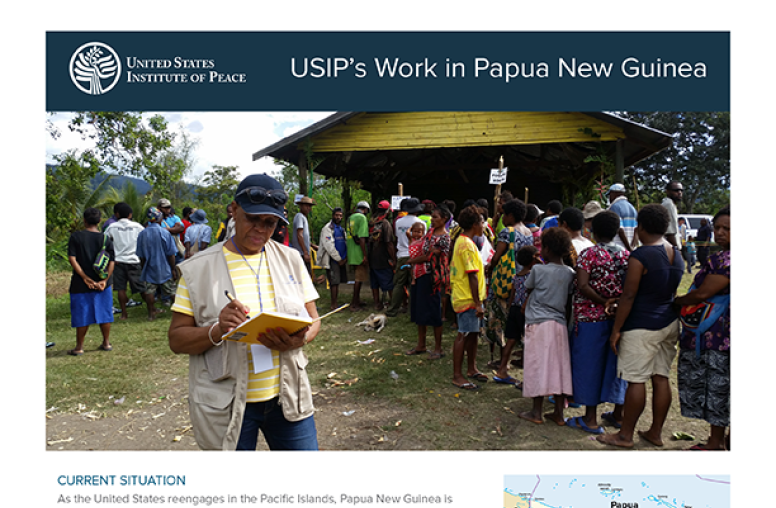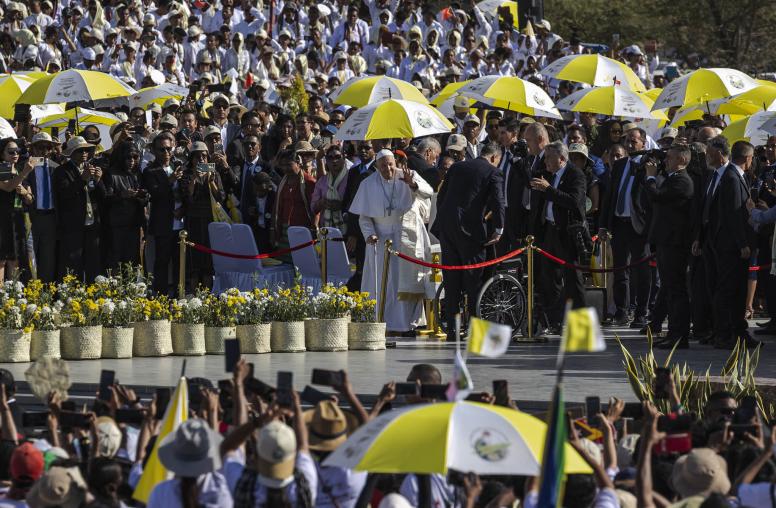In Papua New Guinea, Homegrown Solutions Should Guide U.S. Aid
Consultations and partnerships with civil society and public and private sectors will be key to success of the U.S. Global Fragility Strategy in PNG.
“The world stands today at the dawn of a decisive decade — a moment of consequence and peril, of profound pain and extraordinary possibility,” President Biden declared in April. These words came just two months into Russia’s war on Ukraine and during a time of concern for Western countries as China flexed its muscular diplomacy in the Pacific Islands region. Biden’s statement also sets the scene for the U.S. administration’s new approach to peacebuilding, which aims to prevent conflict from erupting in fragile states by disrupting drivers of instability.

This new approach was legislated as the Global Fragility Act of 2019 (GFA), and will be enacted through the U.S. Strategy to Prevent Conflict and Promote Stability (the Global Fragility Strategy). Papua New Guinea (PNG) — a Pacific Island state experiencing development obstructed by violence and corruption — will be one of four states (and one region) to participate in the program. A 10-year strategy will act as a blueprint of how to address fragility, using all arms of U.S. government and, ideally, all sectors of PNG society.
As Biden said in his statement, “We know that working broadly, strategically, and cooperatively to prevent conflict and instability is the greatest investment we can make … Prevention is hard work — measured not in days and weeks, but in years and generations.”
Ultimately, how the United States implements the GFA in PNG will matter. Programs designed by Papua New Guineans are essential to getting development outcomes because of their greater understanding of the complicated impediments to development. Interventions in PNG often fail because they neglect complex relationships extending beyond formal institutions that are essential to effective policy development and implementation.
Copying and pasting from development templates used in other settings simply won’t work in PNG. Although adapting programs or expertise from other regions or countries may work to an extent (it is unavoidable that experts bring experience and knowledge with them), community-led development is vital for building local competencies and capacity. Engaging locals can also advance policy and aid integration rather than the current highly siloed and fragmented approach.
So how can the United States ensure its strategy design for PNG is homegrown and locally led, when at its core the GFA is still technically a foreign aid program, conceived from afar?
Gender-based violence (GBV) persists in PNG, despite decades of development programs to shift the dial on gender inequality. GBV still affects about two-thirds of all women in PNG. When addressing sensitive matters like gender relations in PNG, the trap the U.S. Government will need to avoid is imposing its worldview on PNG’s socio-cultural system. Successfully navigating this sensitive space will shape the outcome of the United States’ gender strategy.
Why PNG?
PNG shares a border with Indonesia and sits around 100 miles from Australia. It is the largest of all Pacific Island nations in terms of its economy, population, land size and mineral and energy resources. PNG’s great resource wealth has failed to advance development for its growing population of approximately 10 million people. Eighty-seven percent live in remote areas, where infrastructure and services lack, fueling frustration over inequity and development deficits.
Prior to the pandemic, the World Bank estimated that by 2030, one-fifth of PNG’s population would live in extreme poverty. State institutions rarely service people living in hard-to-reach locations, such as the highlands or any of its 600 islands. Large allocations of government funds go directly to local politicians via the District Services Improvement Program (about $2.7 million per member of Parliament) to finance local services, but spending is inequitable and unaccountable, influenced by local politics and relationships. Much is wasted. Resource wealth has tended to curse communities, leading to disputes over land ownership and violence. Other conflict pathways range from the interpersonal (domestic and sorcery-related), to electoral-related violence, and all-out civil war and rebellion.
PNG’s development challenges are difficult to tackle. Australia has always been PNG’s largest donor, providing a rare case of donor concentration, partly because of their long and complex history, with Australia administering PNG for close to seven decades until its independence in 1975. Australia still carries much of the aid assistance weight for its closest neighbors.
Every year Australia contributes around $500 million in Official Development Assistance (ODA) to PNG and in 2008 delivered up to 77 percent of all aid. In recent years, Australia’s contribution as a percentage of overall aid has lessened due to the contributions of multilateral organizations such as the Asian Development Bank. Nonetheless, in comparison, the United States contributions are strikingly less. Between 2008 and 2020, U.S. aid to PNG ranged between .04% and 1.5% of its total ODA. Between 2018 and 2020, the U.S. provided just 0.8 percent of PNG’s total ODA, despite China’s growing presence there. In contrast, China has provided up to 22% of PNG’s total ODA in 2016.
Overall, there is a trend to increasing numbers of donors working in PNG. Aid effectiveness will depend on better donor coordination, and more effective integration with national and regional policy frameworks.
Gender Equality in PNG
Regardless of Australia’s herculean efforts, key development indicators have been hard to budge. Aid has done little to help PNG diminish gender inequalities; PNG performs poorly against the Gender Inequality Index, ranking 161 out of 162, and gender-based, community-based and sorcery-accusation-based violence continue to be worrying. The 2016 PNG Demographic Health Survey found that 63 percent of married women experienced domestic violence, while nearly one in five women experienced violence while pregnant. The United Nations notes the rate of gender-based violence in PNG is twice the global average.
It is not surprising then that PNG has been identified as the most unsafe Pacific country for women and children. Drivers of this pervasive domestic instability include inequities in economic empowerment, political participation, education and services related to family planning, cultural, traditional, and religious beliefs, and social norms placing women and men on an unequal footing.
Due to insufficient funding from PNG’s government, non-government organizations and donor countries have filled the gaps in gender programs. Since 1990, the Australian government delivered programs to address violence against women and girls, including the 10-year program “Pacific Women Shaping Pacific Development.” This program is morphing into “Pacific Women Lead,” designed by Pacific women, after evaluations of the former showed they should be more involved in decisions about their lives and livelihoods.
The U.N. and other donor organizations have been running programs, too — but locally led programs for PNG women are increasing, with organizations such as Femili PNG providing free case management services for victims of violence. Femili PNG notes that its organization is staffed by mostly PNG nationals and is making a difference on the ground where others have failed. Private corporations (especially mining ones) are giving back to communities too. Oil Search, an oil and gas company operating in PNG, has for example set up a foundation to address gender equality.
In 2022, two women were elected to Parliament. It’s a big win, but not enough. PNG women feel too little is done between elections, as a leading Papua New Guinean woman Theresa Meki reflected in the lead up to PNG’s national election. “We only talk about women when it’s election time … There was a whole five years that more things could have been done.” A two-day U.S. government-funded workshop building women’s resilience in the lead-up to PNG’s election is a good example of the shortcomings of donor-led programs. A two-day workshop is not long enough to have an impact as the challenges for women run deep. Longer-term programs such as that run by the PNG women of Seven Sisters Foundation is a better example of how gender equality initiatives can be done right: using long-term strategy to build women’s capacity regardless of where the election cycle is.
Getting it Done Right
Consultations and partnerships with civil society and public and private sectors will be key to success. Listening with humility — a Pacific concept — must be the U.S. Government’s primary tool. Defining a development partnership with PNG’s biggest donor — Australia — will help create synergies in expertise and relationships, while addressing shortfalls in capacity and aid effectiveness. Money will not be the answer; trusted relationships, effective cooperation and innovation are more important than big budgets.
Recognizing drivers of fragility and conflict as identified by Papua New Guineans will increase robustness. As will partnering with home-grown organizations, like Femili PNG and Seven Sisters, that understand and know how to best work in PNG’s complex socio-cultural and political environment. If gender equality is a strategic target, most important will be empowering women safely, meaning men and women must willingly take the journey of development together.
Working with like-minded partners other than Australia will be consequential, too. In June, the United States, Australia, Japan, New Zealand and the United Kingdom formed the Partners in the Blue Pacific (PBP) initiative — an “informal mechanism to support Pacific priorities more effectively and efficiently.” The PBP recognizes that collaboration is important. But how exactly does it look in practice? How does it stay true to its fundamental values (supporting Pacific priorities) and how does it support collaboration for the highest returns?
Designing and implementing the PNG fragility strategy will be a great testing ground for PBP collaboration and U.S. commitment. In the words of a female PNG leader on women’s empowerment, “We’re stronger together.” Given PNG’s small bureaucracy, this is an important message for all. There’s still much to be done to strengthen the lack of coordination and collaboration with other donors in the region.
Jessica Collins is a research fellow for the Pacific Islands Program at the Lowy Institute.




